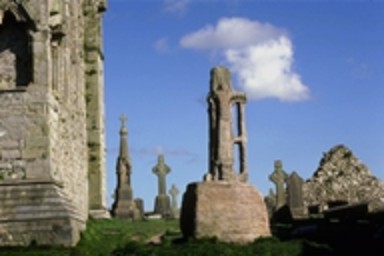| Christian
missionaries sent from the Irish Catholic church, especially during
the sixth and seventh centuries. |
 |
|
Gaelic
crosses, Cashel, Ireland
|
Christianity
appears to have come to the British Isles with missionaries from Rome
or Gaul as early as the second or third century.
Through
the fourth century this church seems to have been a church of the poor
and to have been quite isolated from the mainstream of Roman Christianity
in Europe. It developed a strongly independent way of faith and life notable
for strenuous asceticism, prominent monasteries, the great power of abbots,
itinerant bishops, and a local method for dating Easter. The arrival of
Saxons in the fifth century weakened Celtic Christianity. Augustine
of Canterbury arrived in England in the seventh century as a missionary
of Roman Christianity. At the Synod of Whitby (664) Celtic Christians
agreed to submit to Roman Catholic norms. The Celtic church was the principal
source of Christian missionaries to Europe during the sixth and seventh
centuries. One of the most important centers of missionary energy was
the monastery of Iona off the Scottish
coast. Its founding abbot, Columba, himself made missionary journeys to
Europe.
|